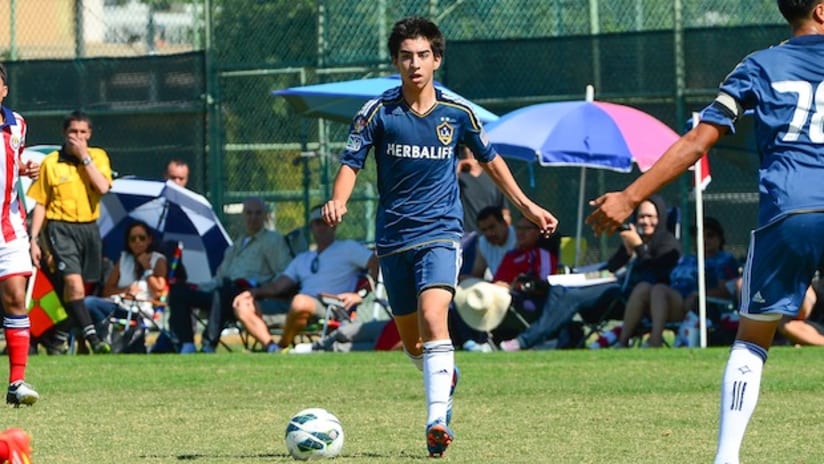(Editor’s Note: This article was originally published in the LA Galaxy Gameday Program that was available at StubHub Center from July 20-Sept. 7.)
The LA Galaxy Academy has had plenty to be proud of since its debut in 2008.
The Galaxy U-18’s recently won their second consecutive U.S. Soccer Development Academy division crown and the U-16’s have taken two of the last three regular season titles, while also claiming the U.S. Soccer Development Academy championship in 2011. Additionally, the program has developed five professional players— Tristan Bowen, Jack McBean, Jose Villarreal, Oscar Sorto and Gyasi Zardes all came through the LA Galaxy Academy and have been rewarded with professional contracts.
Similar to what Barcelona, Real Madrid, and other globally recognizable clubs have long been doing, the LA Galaxy are putting a heavy emphasis on developing, nurturing and retaining top talent within the Academy. The Galaxy have built one of the most established academy systems in the country, and it’s evident at the competitive U-16 and U-18 levels.
But as the sixth season of the U.S. Soccer Development Academy approaches, a new U-13/14 age bracket will join the national competitive fold. The Galaxy already had a U-14 team, but beginning in September, that squad will play on a bigger stage, debuting in the Development Academy along with many of the top club teams in the nation.
“We [the Galaxy] continue to set the standard in terms of academies,” said LA Galaxy Academy Director Peter Vagenas. “We hope to have a blueprint for kids within our area that are hoping to get an early start on the competition. We hope that if they can get into this academy system at a young age and follow the structure that we put forth, they should naturally and gradually progress into our first team.”
Similar to the established U-16 and U-18 leagues, the U-14 league will consist of league play, as well as fall and spring showcase-type competitive periods and a winter futsal period, as well as additional regional and national events. The schedule is also catered to give players much needed transition and preparation periods.
READ: Former LA Galaxy defender Greg Vanney named head coach of the Galaxy Academy U-14’s
With the changes, Vagenas hopes that the newly added league will “allow our group more competitive matches, elongate their season, and expose them to travel scenarios that they didn’t have before.
“In those aspects it raises the level,” he added.
Major additional changes include increasing training to four days-a-week, having a training-to-game ratio of 4-to-1 while competing in approximately 30 games over weekends. This is all excluding the entirely new winter element, futsal.
Futsal, the international form of indoor soccer, is a five-a-side fundamentally-driven style of fast-paced soccer. It’s played on a small indoor pitch and forbids excessive body contact and slide tackles. With the physical element removed from the contest, young players can focus on developing technique, quick footwork, accuracy, balance and awareness.
Although this is something new to the developmental league, Vagenas says that the futsal element “is something that we are already vested in, and is something that we will continue to implement into our curriculum.
“Futsal taps into several areas of development. First and foremost there is a ‘fun-level’ that comes with futsal. We use it as a way to expose our kids to a free-flowing style of play, allowing them to express themselves. There’s less structure, and quite frankly it’s an opportunity for these kids to let their personalities come out on the field in a more free way.”
Futsal is more of an individual sport as fewer players are on the field at a time, but the idea is to give players more freedom to be creative. Similar to pick-up soccer games or young kids just playing around, Vagenas hopes that the players will have more fun while also improving their game.
“At that age it’s more enjoyable for these kids to be put in a professional environment, and it’s also a release for them,” Vagenas said. “Futsal for us serves many purposes.”
The goal of the new bracket is to prepare the players at a younger age. Now instead of just having the U-16 and U-18 teams getting the experience of the extensive travel schedule, kids will be able to adapt earlier and be more prepared down the road.
Vagenas hopes that “young kids, starting at 12-years-old, can progress and one day sign professional contracts, which is quite frankly the point of our academy.”
The LA Galaxy have established a tradition of having players coming up through the Academy and hope that starting players at an even earlier start will add even more to the already strong advantage the Galaxy Academy has.




